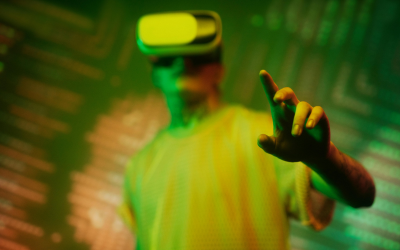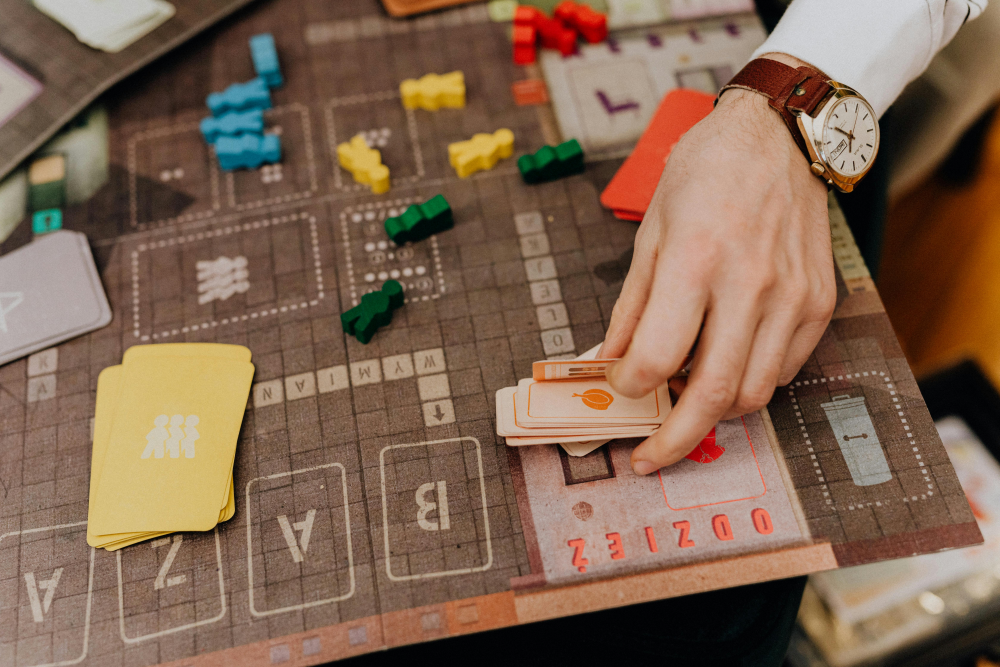Gaming for a Greener Future: How Game Design Can Drive Sustainability at Work

The transition to a greener, more sustainable workplace is a growing challenge for managers. With competing demands, economic constraints, and social responsibilities, making sustainability decisions can be complex. But what if games could help? Games are not just for entertainment - they can be powerful tools to help managers navigate sustainability challenges, experiment with strategies, and collaborate with stakeholders.
Why games for green transition? Why now?
Efforts in organisations towards green transition often involve trade-offs and difficult choices. Managers must balance reducing carbon emissions with financial considerations, all while handling differing stakeholder priorities. Traditional training methods might not fully prepare them for these complexities, but game-based learning offers an interactive and engaging way to practice real-world scenarios in a risk-free environment (Jawad, 2025). Unlike conventional training sessions that rely on passive learning, games immerse players in decision-making processes (Thamarasseri and Chandran, 2025). This experiential learning approach enables managers to grasp sustainability challenges in a more meaningful way. By actively engaging with problems and seeing the immediate consequences of their decisions, they can better understand long-term impacts and explore innovative solutions.
A game to make you think wider and deeper

Imagine a game where you run a fishing company. You must catch enough fish to keep your business profitable, but overfishing will deplete the resource. At the same time, your carbon emissions must stay within set limits. Using dice, cards, and resource management, players must find a balance between financial success and environmental responsibility. At the end of the game, participants reflect on their decisions and brainstorm real-world strategies for greener business practices.
This concept is based on real-world applications of game-based learning in an elective module of The Open University (OU) and The Scholarship Centre for innovation in online Legal and Business education (SCiLAB)’s project ‘Green games for business education’, aiming at investigating how game design pedagogy supports students’ learning and engagement in green transition. Game designs have been used in OU pedagogy and seem to be highly effective. This project focused on the effectiveness of game design for the green transition, which appears to be challenging for students to understand and to develop solutions for (Stanitsas, et. al, 2019).
The power of game design for green transition
The SCiLAB project has found that green game design is more than just fun - it can mirror real-world workplace dynamics. By integrating decision-making, strategic planning, and resource management, games allow players to experience the pressures and trade-offs that come with sustainability initiatives. One participant noted:
‘The creativity in designing a game made me think about different solutions for real-world problems. It made sustainability more relatable and actionable.’ (S-14)
Through storytelling, competition, and collaboration, games engage players in ways that traditional learning cannot. The structured yet flexible nature of game-based learning allows participants to experiment with different strategies, fail safely, and refine their approach—all critical skills in navigating sustainability transitions.
Overcoming green transition challenges
One of the biggest obstacles in sustainability efforts is resistance to change. Employees and stakeholders may have different priorities, making it difficult to implement green policies. Games provide a safe space to explore these challenges, offering hands-on experience with decision-making and its consequences. A student-designed board game, for example, simulated the shift to alternative transport solutions in a business, triggering meaningful discussions among team members:
‘I designed my game to highlight our company’s carbon footprint and how small changes could make a big impact. Seeing it play out in a game setting helped my team take sustainability more seriously.’ (EMA, S-13)
This kind of experiential learning encourages participants to step into different roles and consider sustainability from multiple perspectives. By fostering empathy and collaboration, games can help bridge gaps between departments and stakeholders, making sustainability efforts more cohesive and effective.
Practical applications of gaming in sustainability
Beyond corporate training, game-based learning is being used worldwide to address environmental challenges. Some notable examples include:
- World Climate Simulation: Developed by Climate Interactive and MIT, this role-playing exercise places participants in the shoes of policymakers negotiating global climate agreements. The game demonstrates the complexity of international climate negotiations and the need for collaborative solutions.
- EcoChains: A card game designed to teach players about food chains and the impact of climate change on ecosystems. This game has been used in schools and workplaces to raise awareness about biodiversity and conservation.
- EnerCities: A digital simulation where players must build and manage a sustainable city while balancing energy demands, pollution, and economic growth. Used by educators and corporate trainers, it demonstrates the interconnectedness of urban sustainability challenges.
These examples highlight how games can translate theoretical knowledge into actionable insights, empowering individuals and organisations to take meaningful steps toward sustainability.
Why this matters for managers
By incorporating game-based learning into sustainability training, organisations can:
- Engage employees in sustainability discussions.
- Simulate real-world challenges in a risk-free environment.
- Encourage innovative thinking and problem-solving.
- Foster collaboration across teams.
- Identify practical solutions that can be implemented in real work settings.
Game-based learning has already been successfully implemented in various sectors, including healthcare, finance, and urban planning, to tackle complex decision-making challenges. Its potential in sustainability training is vast, offering managers a fresh and engaging way to think about green transitions.
Looking ahead: the future of game-based learning for green transition
As organisations continue to seek new ways to embed sustainability into their business models, game-based learning is likely to play an increasingly important role. Advances in technology, such as virtual reality (VR) and artificial intelligence (AI), are opening new possibilities for immersive and personalised learning for green transition.
Future developments could include:
- VR sustainability simulations: Virtual environments where managers can practice decision-making in realistic, high-stakes scenarios.
- AI-driven adaptive learning: Games that adjust in real time to individual players’ decisions, providing tailored feedback and insights.
- Multi-stakeholder collaboration platforms: Online multiplayer games where employees from different sectors work together to solve sustainability challenges.
By embracing these innovations, businesses can equip their managers with the tools and mindset needed to drive meaningful change.
Final thoughts: playing your way to a sustainable future
As organisations strive to embrace sustainability as a core business imperative, the role of managers in driving green transition initiatives becomes increasingly pivotal. By harnessing the power of games design and gaming, practicing managers can gain invaluable insights into the complexities of sustainability challenges and navigate the inherent power dynamics of organisational life. Through experimentation, collaboration, and learning, managers can pave the way for a more sustainable future, one game at a time.
Ready to play your way to sustainability? Start by introducing game-based learning in your next strategy session at work. The future of green transition starts with creativity, collaboration, and a roll of the dice.
Dr Olga Andrianova
Olga is a Lecturer in Management in the Department of People and Organisations at The Open University Business School.
Dr Charles Mbalyohere
Charles is a Senior Lecturer in Strategic Management in the Department of Strategy & Marketing at The Open University Business School.
References
- Jawad, A. (2025). Digital Tools and Climate Change Education: Exploring the Role of Digital Games.
- Thamarasseri, I., & Chandran, V. (2025). Education for Sustainability Through Gamification: Exploration Challenges and Opportunities. i-Manager's Journal of Educational Technology, 21(4).
- Stanitsas, M., Kirytopoulos, K., & Vareilles, E. (2019). Facilitating sustainability transition through serious games: A systematic literature review. Journal of cleaner production, 208, 924-936.
Further resources
- Haque, S., Panda, D., & Ghosh, A. (2024). Gamifying sustainability with self-efficacy: motivating green behaviours in large industrial firms. International Journal of Organizational Analysis, 32(11), 74-93.
- Sharma, W., Lim, W. M., Kumar, S., Verma, A., & Kumra, R. (2024). Game on! A state-of-the-art overview of doing business with gamification. Technological Forecasting and Social Change, 198, 122988.

